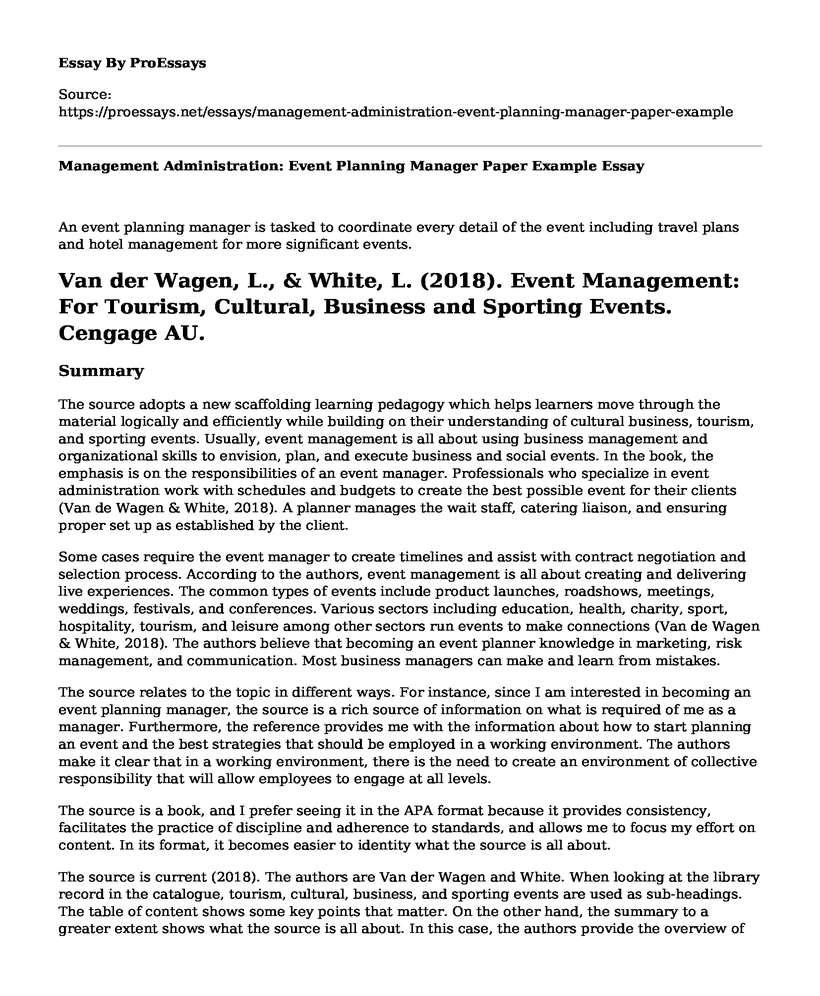An event planning manager is tasked to coordinate every detail of the event including travel plans and hotel management for more significant events.
Van der Wagen, L., & White, L. (2018). Event Management: For Tourism, Cultural, Business and Sporting Events. Cengage AU.
Summary
The source adopts a new scaffolding learning pedagogy which helps learners move through the material logically and efficiently while building on their understanding of cultural business, tourism, and sporting events. Usually, event management is all about using business management and organizational skills to envision, plan, and execute business and social events. In the book, the emphasis is on the responsibilities of an event manager. Professionals who specialize in event administration work with schedules and budgets to create the best possible event for their clients (Van de Wagen & White, 2018). A planner manages the wait staff, catering liaison, and ensuring proper set up as established by the client.
Some cases require the event manager to create timelines and assist with contract negotiation and selection process. According to the authors, event management is all about creating and delivering live experiences. The common types of events include product launches, roadshows, meetings, weddings, festivals, and conferences. Various sectors including education, health, charity, sport, hospitality, tourism, and leisure among other sectors run events to make connections (Van de Wagen & White, 2018). The authors believe that becoming an event planner knowledge in marketing, risk management, and communication. Most business managers can make and learn from mistakes.
The source relates to the topic in different ways. For instance, since I am interested in becoming an event planning manager, the source is a rich source of information on what is required of me as a manager. Furthermore, the reference provides me with the information about how to start planning an event and the best strategies that should be employed in a working environment. The authors make it clear that in a working environment, there is the need to create an environment of collective responsibility that will allow employees to engage at all levels.
The source is a book, and I prefer seeing it in the APA format because it provides consistency, facilitates the practice of discipline and adherence to standards, and allows me to focus my effort on content. In its format, it becomes easier to identity what the source is all about.
The source is current (2018). The authors are Van der Wagen and White. When looking at the library record in the catalogue, tourism, cultural, business, and sporting events are used as sub-headings. The table of content shows some key points that matter. On the other hand, the summary to a greater extent shows what the source is all about. In this case, the authors provide the overview of Event Management. If I were to rate this source, on a scale of 1 to 5, I would give it five because I believe it is the best reference for my research work. It provides a proper analysis of Management Administration (Event Management) and what event managers are required to do in order to achieve their goals and objectives.
References
Van der Wagen, L., & White, L. (2018). Event Management: For Tourism, Cultural, Business and Sporting Events. Cengage AU.
Cite this page
Management Administration: Event Planning Manager Paper Example. (2022, Jul 08). Retrieved from https://proessays.net/essays/management-administration-event-planning-manager-paper-example
If you are the original author of this essay and no longer wish to have it published on the ProEssays website, please click below to request its removal:
- Position Leadership Succession Planning Report
- Essay Sample on Domino's: Strategic Plans and Goals to Thrive in the Food Industry
- Essay Example on UTI in SCI: Risks and Prevention
- Decision Making: The Pivotal Process of Company Growth - Essay Sample
- Data Security Challenges: Computer Hacking Risks & Motivations - Essay Sample
- Paper Sample on Managerial Nepotism: Employment of Family Members in the Workplace
- Starbucks: Brand Positioning - Report Sample







